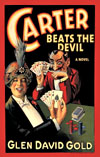
Comment
on this story
|
 |

Carter Beats the Devil beats the odds
by Paul Lewis
The first novel is a tricky thing. At best, it's a work so rich it can never be topped, a watermark of potential; at worst, it sells a few copies and is relegated to cut-out bins in a Big Lots while the author finds his true calling as a cabbie or a short-order cook. In any case, unless you have a publisher's hype-machine set for "kill" behind you, it's hard to get a first book noticed.
Which is why Glen David Gold's Carter Beats the Devil (Hyperion, $24.95) is such a welcome surprise. It's a good first book that's managed to sell some copies and get noticed by both readers and critics, and has even snared some interest in other media, but more on that later. Pardon the appropriate though bad humor when I say that a book this good, inspiring the passion it has among booksellers, is just...magic.
Carter is the semi-biographical work of historical fiction about real-life stage illusionist Charles Carter (a.k.a. "Carter the Great"), and it has every bit of the excitement,  technical virtuosity, and appropriate moments for contemplation as a real stage magic show. It's neither a rip-snortin' adventure tale (though it has those elements in abundance), nor is it a quiet, never-goes-anywhere-except-this-guy's-head character study (though it has those aspects, as well). It's a great book that balances aspects of "real" literature with the sort of pure sense of storytelling that drives many bestsellers, which are roundly and regularly pooh-poohed by literati everywhere. technical virtuosity, and appropriate moments for contemplation as a real stage magic show. It's neither a rip-snortin' adventure tale (though it has those elements in abundance), nor is it a quiet, never-goes-anywhere-except-this-guy's-head character study (though it has those aspects, as well). It's a great book that balances aspects of "real" literature with the sort of pure sense of storytelling that drives many bestsellers, which are roundly and regularly pooh-poohed by literati everywhere.
The story establishes Carter as a curious child and later a struggling vaudevillian who fervently hopes for success to put his wealthy, demanding father at ease. His sheer ingenuity and strength of character eventually win him a headlining act over a devious and evil rival, Mysterioso. In the waning days of his career, a career that has been marked with more triumph and tragedy than any other five lifetimes (not to mention a close friendship with Houdini, who provides Carter with his stage nom de guerre), Carter stages a show attended by none other than President Warren G. Harding, a show that happens to be Harding's final public appearance before his untimely death. One insanely tenacious federal agent, Jack Griffin, has to know if Harding's secret meeting with Carter before the show resulted in foul play. Might the disgraced Mysterioso also have a bone or two to pick with his old adversary? What of inventor Philo Farnsworth, whose strange new contraption is drawing the interest of both the government and the legions of big business? And what in God's name does any of that have to do with a stage magic act?
Pardon my gushing, but this book really is a delight and a treasure. From the evocation of early 20th-century San Francisco and lands far beyond, from the high romance born of Carter's love of adventure and his innate human decency, to the twistings and turnings of governmental and interpersonal intrigue, back to a rich and fulfilling supporting cast of characters, not to mention the sheer pleasure of the magic shows themselves, this book might well have a touchstone every conceivable reader can enjoy. The tale is celebratory yet realistic about Carter's achievements, humanizing a larger-than-life character, and ends on a note of sadness as Carter understands that the age where his sort of illusions could thrive was ending and a new era of mass communication was dawning.
Carter is actually the most recent of a spate of excellent titles using magic and escape artistry as story devices. From Michael Chabon's rightly praised The Amazing Adventures of Kavalier and Clay to Martyn Bedford's sadly overlooked The Houdini Girl, there seems to be something in the authorial waters as writers recognize the richness in character and metaphor magicians automatically convey. Of these tales, Carter is easily the most accessible and reader-friendly.
Just as this review was being finished, word came down from the entertainment rags and websites that none other than Tom Cruise (a.k.a. Tom Mapother), who apparently has optioned any number of those magic-related tales to come down the pike, has also optioned Carter Beats the Devil. While I'd love to see the book get a faithful film adaptation and throw that dynamic time, place, and story up on a canvas of moving light, I'm also a little disillusioned that such a great book might receive a larger audience based on a film treatment rather than its own merits, of which it has many. But such sly misdirection is surely the way of all great stage, screen and literary magic.

March 7, 2002 * Vol. 12, No. 10
© 2002 Metro Pulse
|